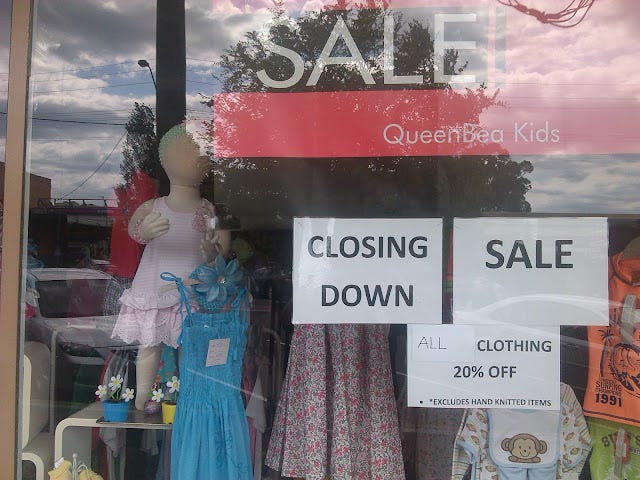
The Death of The Local Shopping Centre, Australia
We were here and there, perplexed, with the coming of the Sales, with a distant cry. I have no faith but the faith in other people's kindness, an old friend said on Facebook, having had a friendly encounter with a US taxi driver. He had no such faith. He compared them to carion birds, ready to pick the flesh off anything that moved. They bolstered their own beliefs by a belief in others, but as the world swirled by, as they did their best to destroy anything and everything he did, he knew the dark soul, the treakle of disease and darkness through which they all waded. He knew there was no love in the heart of others. That all these barren moments led to an even darker, more dismissive moments. To a differnt hope: that it would all be over.
"The world is so beautiful," the Buddha is said to have exclaimed in his dying hours, but whether he had got there was a different question. He missed the world he should have been a part of. He lamented his own stupidity and mistakes. He pined for things that were already lost. It came through time and again, the thud, the thud. The swirling skies and the mismatched motives, assorted faces. He sought kindness where he could find it, and ignored the rest. For all was of a shadow, and he knew not where to go.
If it had been a slow suicide, that was over now. But he still coughed and slept abnormally; and his mind ran around in circles, regretting what had happened. Shame, guilt, regret, remorse, they came in thuds and were dismissed as useless emotions. Because emotions themselves were useless, leading to cringing solitiude and paths not travelled. To encounters ignored. Pasts gone haywire.
Briefly, he couldn't find a way out.
THE BIGGER STORY:
http://www.smh.com.au/federal-politics/political-opinion/tony-abbott-kevin-rudd-julia-gillard-a-year-of-frantic-politics-20131227-2zzmj.html
The same December night General Motors signed the death warrant of Holden, one of Tony Abbott's most senior ministers went looking for love.
While thousands of auto workers began contemplating Christmas with a new uncertainty, the minister texted journalists: ''I got the tone right today, what do you think?''
Such needy egotism would barely be worth mentioning, were it not juxtaposed against the life-altering depth-charge that Holden's demise represents for many Australians.

Illustration: Rocco Fazzari.
Contrary to Labor's characterisation, the car maker's closure was decided in Detroit, but like most everything else in the 2013 political year, it was also mired in our now deeply polarised politics.
Advertisement
A new generation of Liberals was contemptuous of the heavily unionised auto industry and its co-dependent business model reliant on constant government assistance.
In the end, the new government's decision to hold its nerve and let the mainstay of Australia's postwar political-economy slip into history was as brave as it was cold.

Illustration: Rocco Fazzari.
But in the short-term it just added to a growing sense for voters that they'd elected a kind of anti-government - one which stood more determinedly against things than for them.
It was against the minority parliament and everything it produced. It was against the carbon tax, the mining tax, the education funding model (until it wasn't), the national broadband network, climate science and, now, in power itself, it was even against the car industry.
The departure of Holden bookended a year that began with renewed hope for the ALP. Its faint pulse had strengthened from the middle of 2012, when the sky stubbornly refused to fall in with the commencement of the carbon price. Somewhat laughably, what was going to be a wrecking ball for the economy morphed into a slower but equally lethal python squeeze.

Illustration: Rocco Fazzari.
The chasm between such imagery and the equanimity with which the carbon price was absorbed cost the opposition leader much of his personal standing. The result was an Indian summer for Julia Gillard, and it set up 2013 in new and interesting ways.
Despite a horror term, Gillard now eyed the possibility that, in the end, voters might baulk before installing Abbott if she could just give them enough reason to stick.
But her eagerness begat another classic error: the crazy-brave decision to open the political year on January 30 by setting the election for September 14.
Bold, imaginative, or just mad, the idea had several elements. First, she wanted to wrong-foot Abbott from the start of the election year. Second, she hoped to forestall any talk of a leadership change by placing her own party on an election footing. And third, she wanted to fence off some time to leverage the authority of office.
The focus would be on voters and on implementing long overdue reform in areas such as disability insurance, school funding and skills.
''It should be clear to all which are the days of governing and which are the days of campaigning,'' she told the National Press Club.
Yet it was Gillard herself who revealed, just three days later, a reshuffle forced by the departures of her attorney-general, Nicola Roxon, and Senate leader, Chris Evans. Immediately, Labor went straight back to talking about itself. And, of course, that meant demotions and bad blood - for which there would be a heavy price exacted.
The return to normal dysfunction brought to mind John Howard's cutting lament that voters had got just ''five minutes of economic sunshine'' out of Paul Keating before things had turned grey again.
Gillard's period of not-campaigning barely lasted that long, and was already being seen for the stunt it was when she embarked on an ill-conceived campaign swing into western Sydney.
According to a senior Labor figure, the week-long encampment at the Rooty Hill Novotel/RSL complex was always headed for disaster.
''The people in the outer west who, by the way, commute every day, thought it was stupid that the PM had to base herself there to get anything done, even though she has a Sydney residence,'' one exasperated MP said.
''It said it all. It was like declaring they lived in another country.''
And her reassurance that ''Westies'' were not ''second-class citizens'' had the perverse effect of suggesting that the government might actually think they were.
Such missteps kept coming, as did the fortnightly polls, which provided the grim countdown to Labor's inevitable demise.
As Fairfax Media's Tim Colebatch reported in June, the government's descent was being led by Gillard herself.
''A comparison of Fairfax/Nielsen polls in the 2010 campaign with those in the first half of 2013 shows Ms Gillard's net approval rating has slumped by a massive 33 percentage points,'' he wrote.



